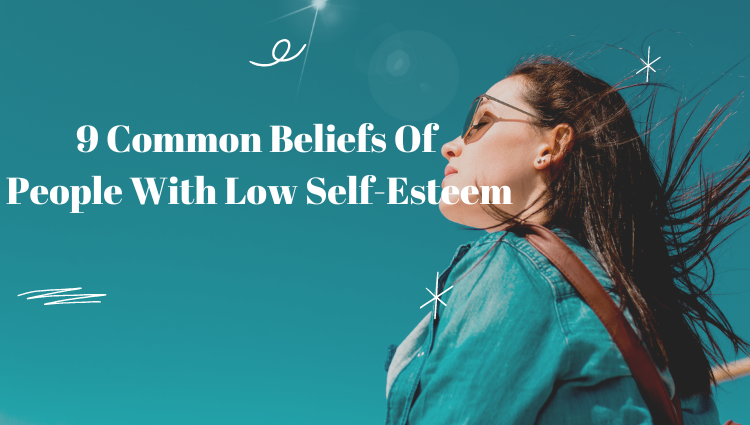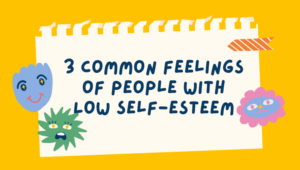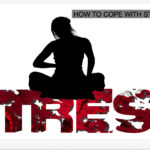It is no secret that our society is rife with low self-esteem.
In fact, it has become so common that it is now considered normal. This is a problem because low self-esteem can lead to all sorts of negative consequences, such as depression, anxiety, and even suicide.

9 Common Beliefs Of People With Low Self-Esteem
What is low self-esteem?
Low self-esteem is when someone has an excessively negative view of themselves such as a feeling of self-loathing and inadequacy. This can manifest in many different ways, such as thinking you are not good enough, feeling unworthy, or believing that you are a failure.
Therefore, people with low self-esteem may be vulnerable to a sense of shame and embarrassment.
What is the cause of low self-esteem?
So what exactly is the cause of low self-esteem?
There is no one answer to this question, as low self-esteem can be caused by a variety of factors. However, there are some common themes that can contribute to low self-esteem, such as:
• A history of negative experiences, such as being bullied or feeling like an outsider.
• A lack of positive role models in your life.
• A lack of self-confidence or feeling like you’re not good enough.
• A negative body image.
• Comparison with others.
Why is low self-esteem so common?
It’s no secret that low self-esteem is a common problem. In fact, it’s estimated that as many as 80% of people struggle with low self-esteem at some point in their lives.
There are a number of reasons why low self-esteem is so common. One of the most significant factors is the way we’re socialized. From a young age, we’re bombarded with messages that tell us we’re not good enough. We’re told that we need to be thinner, prettier, smarter, and more successful in order to be happy and valued.
These messages can be incredibly damaging, and they can have a lasting impact on our self-esteem. Even if we don’t consciously believe these things, they can still influence the way we see ourselves.
Another reason low self-esteem is so common is that it’s often reinforced by our experiences. If we consistently have negative experiences, such as being rejected or treated poorly, it can further lower our opinion of ourselves.
It can be difficult to break out of the cycle of low self-esteem, but it’s important to remember that you’re not alone. There are many people who have overcome low self-esteem and gone on to lead happy and fulfilling lives.
What are the consequences of low self-esteem?
When you have low self-esteem, you may not believe in yourself as much as you should. This can lead to a number of issues, such as not taking risks or not going after your dreams.
Additionally, low self-esteem can cause you to be more critical of yourself. You may dwell on your flaws and mistakes, which can lead to a lack of confidence.
These negative thoughts and behaviours can have a number of consequences, both in the short and long run.
In the short term, low self-esteem can lead to anxiety and depression. You may find yourself withdrawing from social situations and avoiding new experiences. This can make it difficult to form or maintain relationships.
In the long term, low self-esteem can lead to chronic health problems. Studies have shown that people with low self-esteem are more likely to suffer from heart disease, obesity, and diabetes.
Low self-esteem can also have an impact on your career. You may be less likely to take risks or to pursue your dream job. This can lead to stagnation in your career and a feeling of dissatisfaction.
9 Common Beliefs If You Struggle With Low Self-Esteem
1. “I’m not good enough.”
There is no one right answer when it comes to self-esteem. However, one of the most common beliefs that leads to low self-esteem is the belief that you’re not good enough.
If you don’t believe that you’re good enough, you’ll never try to achieve anything great. You’ll also be less likely to feel confident in your abilities and be content with your current situation.
Instead, you’ll constantly feel the need to prove yourself to others and feel like you’re not good enough. This can lead to a lot of negative consequences, including low self-esteem, anxiety, and depression.
2. “I’m ugly.”
If you believe that you’re ugly, it’s time to start seeing yourself in a new light.
Start by looking at yourself in the mirror and saying three things that you like about your appearance. It could be anything from your eyes to your smile. Do this every day, and eventually, you’ll start to see yourself in a new, more positive way.
3. “I’m undeserving.”
If you believe that you don’t deserve good things in life, it’s time to change your thinking. Start by acknowledging your accomplishments, no matter how small they may be. Then, start setting goals for yourself and taking steps to achieve them.
As you start accomplishing more, you’ll start to feel more deserving of good things in life.
4. “I’m unlovable.”
This is a common belief among people with low self-esteem, but it’s simply not true. There are people in this world who love you, no matter what.
If you have trouble believing that you’re lovable, start by writing down all of the qualities that you have that you think would make someone love you. Then, look for people in your life who show you love and appreciation.
5. “I’m defective.”
This belief is often at the root of low self-esteem. If you believe that you’re defective, it’s time to start changing your thinking.
Start by accepting yourself for who you are, flaws and all. Then, start working on improving the areas of your life that you’re unhappy with.
6. “I’m vulnerable.”
This is another common belief among people with low self-esteem. If you believe that you’re vulnerable, it’s time to start changing your thinking.
Start by accepting that everyone is vulnerable. We all have weaknesses and we all make mistakes. What makes us strong is how we deal with our vulnerabilities.
7. “I’m a loser.”
This is a common belief among people with low self-esteem, but it’s simply not true. You are not a loser.
Start by acknowledging your accomplishments, no matter how small they may be. Then, start setting goals for yourself and taking steps to achieve them.
8. “I’m weak.”
This is a common belief among people with low self-esteem, but it’s simply not true. We all have weaknesses, but what makes us strong is how we deal with them.
Start by accepting yourself for who you are, flaws and all. Then, start working on improving the areas of your life that you’re unhappy with.
9. “I’m stupid.”
This is a common belief among people with low self-esteem, but it’s simply not true. You are not stupid.
Start by acknowledging your accomplishments, no matter how small they may be. Then, start setting goals for yourself and taking steps to achieve them.
Conclusion
These are 9 common beliefs that people with low self-esteem have. If you have any of these beliefs, it’s time to start changing your thinking.
Remember, you are not defined by your beliefs. You can change your beliefs and improve your self-esteem.






